| Margrethe II | |||||
|---|---|---|---|---|---|
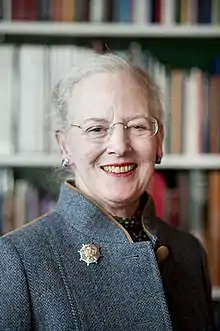 Formal portrait, 2012 | |||||
| Queen of Denmark | |||||
| Reign | 14 January 1972 – 14 January 2024 | ||||
| Predecessor | Frederik IX | ||||
| Successor | Frederik X | ||||
| Prime ministers | See list | ||||
| Born | 16 April 1940 Amalienborg, Copenhagen, Denmark | ||||
| Spouse | |||||
| Issue Detail | |||||
| |||||
| House | Glücksburg[1] | ||||
| Father | Frederik IX of Denmark | ||||
| Mother | Ingrid of Sweden | ||||
| Religion | Church of Denmark | ||||
| Signature | |||||
| Danish royal family |
|---|
 |
|
|
| Extended royal family |
Margrethe II (Danish: [mɑˈkʁeˀtə]; Margrethe Alexandrine Þórhildur Ingrid, born 16 April 1940) is a member of the Danish royal family who reigned as Queen of Denmark from 1972 until her abdication in 2024. Having reigned for 52 years, she is the longest-serving female monarch in Danish history.
Born into the House of Glücksburg, a cadet branch of the House of Oldenburg, Margrethe is the eldest child of King Frederik IX and Queen Ingrid. She became heir presumptive to her father in 1953, when a constitutional amendment allowed women to inherit the throne. In 1967, she married Henri de Laborde de Monpezat, with whom she had two sons: Frederik and Joachim. Margrethe succeeded her father upon his death on 14 January 1972.
As sovereign, Margrethe received 42 official state visits and she undertook 55 foreign state visits herself.[2][3] Margrethe has worked as a scenographer, a costume designer, and an illustrator of works by J. R. R. Tolkien. She and the royal family have made several other foreign visits.[2] During her reign, support for the monarchy in Denmark remained consistently high at around 82%, as did Margrethe's personal popularity.[4][5]
During her annual New Year's Eve address on 31 December 2023, Margrethe announced her abdication in favour of her son Frederik on 14 January 2024, the 52nd anniversary of her accession.[6]
Early life and education

Margrethe was born as a Princess of Denmark 16 April 1940 at 10:10 CET at Frederik VIII's Palace, in her parents' residence at Amalienborg, the principal residence of the Danish royal family in the district of Frederiksstaden in central Copenhagen.[7] She was the first child of the Crown Prince and Crown Princess (later King Frederik IX and Queen Ingrid). Her father was the elder son of the then-reigning King Christian X, while her mother was the only daughter of the then Crown Prince of Sweden (who would later reign as King Gustaf VI Adolf). Her birth took place just one week after Nazi Germany's invasion of Denmark on 9 April 1940.[8]
Margrethe was baptised on 14 May in the Holmen Church in Copenhagen.[8] Her godparents were her grandfathers, King Christian X of Denmark and the then Crown Prince Gustaf Adolf of Sweden; her maternal great-grandfathers, King Gustaf V of Sweden and Prince Arthur, Duke of Connaught and Strathearn; her uncles, Prince Knud of Denmark and Prince Gustaf Adolf, Duke of Västerbotten; as well as her first cousin twice removed, Prince Axel of Denmark.[7] She was named Margrethe – the Danish variation of her late maternal grandmother Crown Princess Margareta of Sweden's name – Alexandrine after her paternal grandmother, Queen Alexandrine, and Ingrid after her mother. Since her paternal grandfather was also King of Iceland at the time of her birth, she was given the Icelandic name Þórhildur.[9] Like her maternal grandmother, Margrethe is known affectionately as "Daisy" to her family and close friends.[10]
The birth of her younger sisters Benedikte and Princess Anne-Marie followed in 1944 and 1946 respectively. Margrethe and her sisters grew up in apartments at Frederik VIII's Palace at Amalienborg in Copenhagen and in Fredensborg Palace in North Zealand. She spent summer holidays with the royal family in her parents' summer residence at Gråsten Palace in Southern Jutland. On 20 April 1947, following the death of King Christian X, Margrethe's father ascended the throne as King Frederik IX.[11]
Education
Margrethe was educated at the private school N. Zahle's School in Copenhagen, from which she graduated in 1959. She spent a year at North Foreland Lodge, a boarding school for girls in Hampshire, England,[12] and later studied prehistoric archaeology at Girton College, Cambridge, during 1960–1961, political science at Aarhus University between 1961 and 1962, attended the Sorbonne in 1963, and was at the London School of Economics in 1965.[13] She is a Fellow of the Society of Antiquaries of London.[8]
Margrethe is fluent in Danish, French, English, Swedish and German, and has a limited knowledge of Faroese.[8][13]
Heir presumptive
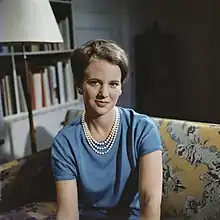
At the time of her birth, only males could ascend the throne of Denmark, owing to the changes in succession laws enacted in the 1850s when the Glücksburg branch was chosen to succeed. As Margrethe had no brothers, it was assumed that her uncle Prince Knud would one day assume the throne.[14]
The process of changing the constitution started in 1947, not long after Margrethe's father ascended the throne and it became clear that Queen Ingrid would have no more children. The popularity of Frederik and his daughters and the more prominent role of women in Danish life started the complicated process of altering the constitution. The law required that the proposal be passed by two successive Parliaments and then by a referendum, which occurred on 27 March 1953. The new Act of Succession permitted female succession to the throne of Denmark, according to male-preference cognatic primogeniture, where a female can ascend to the throne only if she does not have a brother. Princess Margrethe therefore became heir presumptive.[8] In 2009, the law of succession was modified into absolute primogeniture.[15]
Margrethe attended the traditional New Year Courts for the first time in 1956.[7] On her eighteenth birthday, 16 April 1958, Margrethe was given a seat in the Council of State. She subsequently chaired the meetings of the Council in the absence of the King.[8] In 1960, together with her first cousin, Princess Margaretha of Sweden, and Princess Astrid of Norway, she travelled to the United States, which included a visit to Los Angeles, and to the Paramount Studios, where they met several celebrities, including Dean Martin, Jerry Lewis and Elvis Presley.[16]
She paid her first visit to the Faroe Islands in 1959, alongside her parents and sisters, and to Greenland in 1960.[7]
Marriage and family
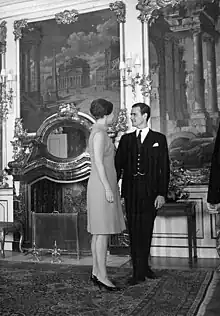
While Margrethe studied in London, she met the French diplomat, Henri de Laborde de Monpezat, who was legation secretary at the French Embassy in London. Their engagement was announced on 5 October 1966. They were married on 10 June 1967, at the Holmen Church in Copenhagen, and the wedding reception was held at Fredensborg Palace.[8] Laborde de Monpezat received the style and title of "His Royal Highness Prince Henrik of Denmark" because of his new position as the spouse of the heir presumptive to the Danish throne.[8] They were married for over fifty years, until his death on 13 February 2018.[8]
Less than a year after the wedding, Margrethe gave birth to her first child, a son, on 26 May 1968. By tradition, Danish kings were alternately named either Frederik or Christian. She chose to maintain this by assuming the position of a Christian, and thus named her elder son Frederik. The following year, a second child, named Joachim, was born on 7 June 1969.[8]
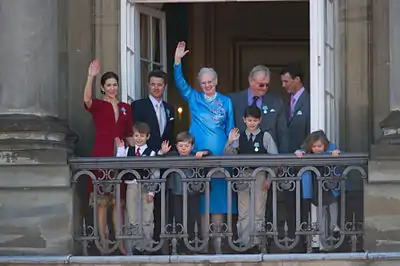
In 1974, she and Henrik purchased Château de Cayx in the wine district of Cahors in Southern France.[7]
Margrethe announced in 2008 that her male-line descendants would bear the additional title of Count or Countess of Monpezat in recognition of her husband's ancestry.[17]
In 2022, the Queen announced that, from the start of 2023, the descendants of Prince Joachim will only be able to use their titles of Count and Countess of Monpezat, their previous titles of Prince and Princess of Denmark ceasing to exist. To allow the children, who were never expected to hold an official role within the royal family, to have normal lives, the Queen wanted "to create a framework for the four grandchildren, to a much greater degree, to be able to shape their own existence without being limited by the special considerations and obligations that a formal affiliation with the Royal House as an institution implies".[18] Her son, Joachim, daughter-in-law, Marie, former daughter-in-law, Alexandra, and eldest grandson, Nikolai, publicly expressed shock and confusion because of the decision,[19] after which Margrethe released a statement in which she said that it saddened her that she had upset Joachim's family.[20]
Along with her late husband, Margrethe has kept dachshunds since the 1970s.[7] She currently has one dog, the dachshund Tilia, who was Prince Henrik's dog until his death in 2018.
Reign
Accession
Shortly after King Frederik IX delivered his New Year's Address to the Nation at the 1971/72 turn of the year, he fell ill, and died 14 days later on 14 January 1972. Margrethe succeeded to the throne at the age of 31, becoming the first female Danish sovereign under the new Act of Succession. She was proclaimed Queen from the balcony of Christiansborg Palace 15 January 1972 by Prime Minister Jens Otto Krag. Queen Margrethe II relinquished all the monarch's former titles except the title to Denmark, hence her style "By the Grace of God, Queen of Denmark" (Danish: Margrethe den Anden, af Guds Nåde Danmarks Dronning). The Queen chose the motto: God's help, the love of The People, Denmark's strength.[13] She chose to be known as Margrethe II in recognition of the 14th century Danish regent, Margrethe, who has been publicly known as Queen Margrethe despite never being crowned.[7]
In her first address to the people, Queen Margrethe II said:
My beloved father, our King, is dead. The task that my father had carried for nearly 25 years is now resting on my shoulders. I pray to God to give me help and strength to carry the heavy heritage. May the trust that was given to my father also be granted to me.[21]
Constitutional role
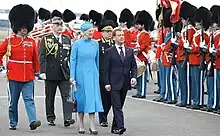
The Queen's main tasks were to represent the Kingdom abroad and to be a unifying figure at home. She performs the latter by opening exhibitions, attending anniversaries and inaugurating bridges, among other things. She receives foreign ambassadors and awards honours and medals.
As a constitutional sovereign, the Queen took no part in party politics and does not express any political opinions. Although she had the right to vote, she opted not to do so to avoid even the appearance of partisanship.[8]
The Queen held a meeting with the prime minister and the foreign affairs minister every Wednesday, unless she or the prime minister was outside of the kingdom.
After an election where the incumbent prime minister does not have a majority behind him or her, the Queen held a "Dronningerunde" (Queen's meeting) in which she met the chairmen of each of the Danish political parties.[22]
.jpg.webp)
Each party has the choice of selecting a royal investigator to lead these negotiations or alternatively, give the incumbent prime minister the mandate to continue his or her government as is. In theory each party could choose its own leader as royal investigator, as the social liberal Det Radikale Venstre did in 2006, but often only one royal investigator is chosen plus the prime minister, before each election. The leader who, at that meeting succeeds in securing a majority of the seats in the Folketing, is by royal decree charged with the task of forming a new government. (No party has held an absolute majority in the Folketing since 1903.)
Once the government had been formed, it was formally appointed by the Queen. Officially, it was the Queen who was the head of state, and she therefore presided over the Council of State (privy council), where the acts of legislation which have been passed by the parliament are signed into law. In practice, nearly all of the Queen's formal powers were exercised by the Cabinet of Denmark.
It was customary for Margrethe as the Danish monarch to host annual New Year levées. Every year on 1 January, a banquet was held for the government, the Speaker of the Danish Parliament, representatives of official Denmark and the Royal Court at Christian VIII's Palace at Amalienborg. On day 2, a levée was held at Christian VIII's Palace for the justices of Supreme Court of Denmark and the Officer Corps of The Royal Life Guards and The Guard Hussar Regiment, while a levée for the diplomatic corps will be held at Christiansborg Palace afterwards. On day 3, a New Year’s levee was held for officers from the Defence and the Danish Emergency Management Agency, the I., II. and III. ranking classes as well as invited representatives of major national organisations and the royal patronages.[23]
Official duties
As of January 2024, the Queen holds 72 Danish and 8 foreign patronages including Aarhus Festuge, ARoS Aarhus Kunstmuseum, DaneAge Association, Danes Worldwide, the Danish Animal Welfare Society, the Danish Cancer Society, Den Gamle By, Det Classenske Fideicommis, the Danish Bible Society, Det Kongelige Vajsenhus, Diakonissestiftelsen, Foreningen Norden, Land of Legends (Sagnlandet Lejre), M/S Maritime Museum of Denmark, Moesgaard Museum, National Olympic Committee and Sports Confederation of Denmark, Nyborg Slot, Rebild National Park, the Royal Danish Academy of Music, Royal Danish Academy of Sciences and Letters, Royal Danish Yacht Club, Rungstedlund Foundation, Sankt Lukas Stiftelsen, Vallø stift and Vemmetofte.[24]
A pillar of Margrethe's reign has been an intricate knowledge of and connection to all parts of the Danish Realm. In 2016, she contributed to a book about Denmark's history.[25]
The Queen is colonel-in-chief of the Princess of Wales's Royal Regiment (Queen's and Royal Hampshires), an infantry regiment of the British Army, following a tradition dating back to 1906 when Edward VII, married to Alexandra of Denmark, appointed his brother-in-law, Frederik VIII of Denmark, colonel-in-chief of the then Buffs (Royal East Kent Regiment).[8][26]
Residences
The official residences of the Queen are Amalienborg Palace (where she resides in Christian IX's Palace) in Copenhagen and Fredensborg Palace near Hillerød. Her summer residences are Marselisborg Palace[27] near Aarhus and Gråsten Palace[28] near Sønderborg, the former home of her mother, Queen Ingrid, who died in 2000.[29]
Silver and Ruby Jubilees
Queen Margrethe II marked her Silver Jubilee in 1997 with a religious service and a gala dinner attended by fellow Scandinavian royals.[30] She celebrated her Ruby Jubilee, the 40th year on the throne, on 14 January 2012.[31] This was marked by a church service, concert, carriage procession, gala banquet at Christiansborg Palace and numerous TV interviews.[30]
Immigration debate
In her annual New Year's Eve address in 1984, the Queen addressed the xenophobia experienced by many immigrants in Denmark:
We have the peace, the free political life and social relations that make our country a sought-after haven for many. Refugees from very different backgrounds come here, sometimes injured in both mind and body. We welcome them and are probably also a little proud that they have chosen our little paradise, but when we see them fumbling with our way of life and our language, hospitality becomes difficult all too quickly, and disappointment sets in on both sides. There are also others who have felt that, namely the guest workers and their families (...) Then we come with our 'Danish humour' and little cocky remarks. Then we meet them with coolness, and then there is not far to harassment and rougher methods – we cannot allow that. If we want the new year to be better than the old, then here is a good place to start.
The term "dumsmarte bemærkninger" ("cocky remarks", or directly translated "dumb-slick remarks") has since become an integrated part of the Danish vocabulary.[32]
In an interview within the 2016 book De dybeste rødder (The Deepest Roots), according to historians at the Saxo Institute of the University of Copenhagen she showed a change in attitude to immigration towards a more conservative stance. She stated that the Danish people should have more explicitly clarified the rules and values of Danish culture in order to be able to teach them to new arrivals. She further stated that the Danes in general have underestimated the difficulties involved in successful integration of immigrants, exemplified with the rules of a democracy not being clarified to Muslim immigrants and a lack of readiness to enforce those rules. This was received as a change in line with the attitude of the Danish people.[33][34]
Golden Jubilee

The Queen's Golden Jubilee was marked on 14 January 2022, with celebrations to take place later in the year. In September, following the death of Queen Elizabeth II, it was announced by the Royal House that it was "Her Majesty The Queen's wish that a number of adjustments be made" to the upcoming celebrations.[35]
Since Elizabeth II's death, Margrethe has been Europe's longest-reigning current monarch, the world's only queen regnant, and the longest-serving incumbent female head of state.[36]
Abdication
In her annual live broadcast New Year's Eve address on 31 December 2023, Margrethe announced her abdication, which took place on 14 January 2024, the 52nd anniversary of her accession to the throne.[37] She said that time had taken its "toll", that her number of "ailments" had increased, and that she cannot undertake as many duties as in the past. She cited her extensive back surgery in February 2023, and said that the operation made her reassess her position and consider "whether now would be an appropriate time to pass on the responsibility to the next generation".[38]
She was succeeded by her elder son, Crown Prince Frederik as King Frederik X.[39][40] Mirroring her first New Year Address in 1972, she said of the succession:
The support and assistance which I have received throughout the years, have been crucial to the success of my task. It is my hope that the new King and Queen will be met with the same trust and devotion which have fallen to my lot.[38]
Since her abdication, she has been referred to as "Her Majesty Queen Margrethe".[41]
Health
The Queen has had a number of health issues. During the 1990s and early 2000s, she underwent several operations on her right knee due to injuries and osteoarthritis. In 1994, she was treated for cervical cancer.[42] In 2003, she underwent a 4.5 hour long operation for spinal stenosis.[43]
On 9 February 2022, the Danish court disclosed in a press release that the Queen had contracted COVID-19.[44] On 13 February, the Queen could leave home isolation after having had a mild case of the virus.[45] On 21 September 2022, the Danish Royal House disclosed in a press release that Margrethe had again contracted COVID-19, after attending the funeral of Elizabeth II, her third cousin, in London.[46][47] She left home isolation on 26 September and resumed her official duties immediately, stating that she felt fine.[48]
On 22 February 2023, the Queen underwent "major back surgery" at Rigshospitalet due to continued back pain.[49] In a statement the following day, a representative for the Queen said that the surgery had gone well and that she had already been up for a walk.[43] She was discharged from the hospital on 2 March,[49][50] and returned from sick leave on her birthday on 16 April.
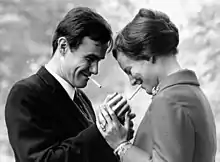
Margrethe has been a chain smoker and is well known for her tobacco habit.[51] On 23 November 2006, the Danish newspaper B.T. printed an announcement from the Royal Court that the Queen would henceforth smoke only in private. She has not smoked since her spinal surgery in February 2023.[52]
Public image and style
Margrethe wears designs by former Pierre Balmain designer Erik Mortensen, Jørgen Bender, and Birgitte Taulow. In March 2013, The Guardian listed her as one of the fifty best-dressed over 50s.[55] In connection with her 80th birthday, British Vogue published an article calling her "An Unsung Style Heroine."[56]
The Queen has been depicted on the annual Christmas seal twice. As a child in 1942 and after her ascension to the throne in 1972.[7] In 1985, Andy Warhol depicted Margrethe on silkscreen as a part of his Reigning Queens series.
Personal interests
Archaeology
Margrethe is known for her strong archaeological passion and has participated in several excavations, including in Italy, Egypt, Denmark and South America.[57] She shared this interest with her grandfather, Gustaf VI Adolf of Sweden, with whom she spent some time unearthing artefacts near Etruria in 1962.[4]
Church textiles
Since the 1970s, Margrethe has designed and embroidered several vestments and church textiles for churches in Denmark, Greenland, Germany and England.[58] She has designed a chasuble for Fredensborg Palace Church which was since embroidered by her mother, Queen Ingrid, and appliquéd by her sister, Princess Benedikte. The textile was presented to the church on its 250th anniversary in 1976. In 1989, Margrethe designed the bishop's robe for the Diocese of Viborg. In 2017, she designed the antependium for the All Saints' Church in Wittenberg, Germany. In 2020, she designed the chasuble for the Danish Church of St Katharine in Camden, London.[59]
In addition to the church textiles, Margrethe has various other things, including an altarpiece for Skei Mountain Church in Norway, a Christmas spoon, the annual Danish Christmas seals in 1970, 2003 and 2015, and Greenland's Christmas seal in 1983.[60]
Découpage
Since the mid-1970s, Margrethe has been using the découpage technique, which involves combining clippings from periodicals and books for new motifs. This technique is used in auction catalogues, home magazines, and furniture decorations. The découpage often references literary, mythological, or art-historical topics, and is often displayed in royal palaces, particularly Christian VII's Palace at Amalienborg. Sealed with a protective lacquer, the Queen's découpage works generally have references to literary, mythological or art-historical topics.[61]
Margrethe's découpage works have also been used in various books and films, including Prince Henrik's poetry collections Cantabile (2000) and Frihjul (2010).[61]
Embroidery
As a child, Margrethe preferred drawing rather than needlework, but since 1960, numerous embroideries have been presented as gifts or used in the Queen's own rooms. The embroideries are made from patterns that Margrethe herself creates on graph paper, which includes twining shapes and the recipient's monogram. The Queen has designed several embroideries for the Danish Handcraft Guild, including patterns for calendars, cushion covers and dinner mats. Margrethe has also designed evening bags and spectacle cases for friends and family members, including Christmas calendars for all of the grandchildren, cushion covers and furniture covers for the palaces, and fireplace screens for Fredensborg Palace.[62]
The Queen's private embroideries were exhibited at Koldinghus Castle in 2021.[62]
Films
The Queen has worked as a screenwriter alongside Per Brink Abrahamsen on the two Hans Christian Andersen adaptations The Snow Queen from 2000 and The Wild Swans from 2009. Additionally, she narrated the former and made an uncredited acting cameo as a "member of the mob" in the latter.
Using decoupage as her primary craft, she has also been a set designer for:
- The Snow Queen (2000)
- The Wild Swans (2009)
- Ehrengard: The Art of Seduction (2023)
Margrethe was nominated for her work on Ehrengard: The Art of Seduction in the categories Best Costume Design and Best Production Design at the 41st Robert Awards.[63]
Monograms
In 2004, Margrethe designed the official monogram of her second cousin twice removed, Princess Ingrid Alexandra of Norway.[64] She has also designed her own personal monogram; the personal monograms of her son Frederik, daughter-in-law Mary and grandson Christian; as well as the joint monograms of the Danish Crown Prince couple as well as the Norwegian Crown Prince couple, her godson, Haakon, and his wife, Mette-Marit.
Scenography and costume design
Over the years, Margrethe has become involved in ballet as a scenographer and costume designer.[65] She designed the costumes for the Royal Danish Ballet's production of A Folk Tale and for the 2009 Peter Flinth film, De vilde svaner (The Wild Swans).[8][66] She also designs her own clothes and is known for her colourful and sometimes eccentric clothing choices. The Queen designed 51 costumes for the 2023 film Ehrengard: The Art of Seduction as well as 81 decoupages that were the basis for the sets.[67][68]
Margrethe has designed sets and costumes for numerous ballets. Since 2001, she has worked with the Tivoli Ballet Theatre:[69]
- 1991: A Folk Tale, Royal Danish Theatre
- 2005 & 2011: Thumbelina, Pantomimeteatret
- 2007, 2013 & 2018: The Tinderbox, Pantomimeteatret
- 2009: The Swineherd, Pantomimeteatret
- 2012, 2014, 2016, 2018 & 2022: The Nutcracker, Tivoli Concert Hall
- 2013: The Steadfast Tin Soldier, Pantomimeteatret
- 2016: Cinderella, Pantomimeteatret
- 2019, 2021 & 2023: The Snow Queen, Tivoli Concert Hall
Visual art
Margrethe is an accomplished painter and has exhibited many of her works over the years.[70] In 2000, she illustrated Prince Henrik's poetry collection Cantabile. Under the title From mountains to coast, she and her close friend, Queen Sonja of Norway, exhibited selected works inspired by nature at the Barony Rosendal in 2015.
Under the pseudonym Ingahild Grathmer (the latter being an anagram for Margrethe and the former made up of her secondary names Ingrid, Alexandrine and Þórhildur), her illustrations were used for Danish editions of The Lord of the Rings, which she was encouraged to illustrate in the early 1970s.[71] She sent them to J. R. R. Tolkien, who was struck by the similarity of her drawings to his own style.[72] Margrethe's drawings were redrawn by the British artist Eric Fraser for the Folio Society's English edition of The Lord of the Rings, first published in 1977 and reissued in 2002.
Honours
National
 Denmark:
Denmark:
- 20 April 1947: Knight of the Order of the Elephant (R.E.)[73]
- 14 January 1972 – 14 January 2024: Sovereign of the Order of the Elephant
- 14 January 1972: Grand Commander of the Order of the Dannebrog (S.Kmd.)
- 14 January 1972 – 14 January 2024: Grand Master of the Order of the Dannebrog
- Knight of the Decoration of the Cross of Honour of the Dannebrog (D.Ht.)[73]
- Homeguard Medal of Merit[73]
- 25 years of Homeguard Service Medal[73]
- Medal of Honour of the League of Civil Defence[73]
- Medal of Honour of the Reserve Officers League[73]
- 100th Anniversary Medal of the Birth of King Christian X[73]
- 50th Anniversary Medal of the arrival of Queen Ingrid to Denmark[73]
- 100th Anniversary Medal of the Birth of King Frederik IX[73]
- Queen Ingrid Commemorative Medal[73]
- 20 April 1947: Knight of the Order of the Elephant (R.E.)[73]
 Greenland:
Greenland:
Foreign
 Argentina: Grand Cross of the Order of the Liberator San Martín[73]
Argentina: Grand Cross of the Order of the Liberator San Martín[73] Austria: Grand Star of the Decoration of Honour for Services to the Republic of Austria[73][74]
Austria: Grand Star of the Decoration of Honour for Services to the Republic of Austria[73][74].svg.png.webp) Belgium: Grand Cordon of the Order of Leopold I[73]
Belgium: Grand Cordon of the Order of Leopold I[73] Brazil: Grand Collar of the Order of the Southern Cross[73]
Brazil: Grand Collar of the Order of the Southern Cross[73] Bulgaria: Sash of the Order of the Stara Planina[73]
Bulgaria: Sash of the Order of the Stara Planina[73] Chile: Grand Cross of the Order of the Merit of Chile[73]
Chile: Grand Cross of the Order of the Merit of Chile[73] Estonia: Collar of the Order of the Cross of Terra Mariana[73]
Estonia: Collar of the Order of the Cross of Terra Mariana[73] Egypt: Collar of the Order of the Nile[73]
Egypt: Collar of the Order of the Nile[73] Finland: Grand Cross with Collar of the Order of the White Rose[73]
Finland: Grand Cross with Collar of the Order of the White Rose[73] France: Grand Cross of the Order of the Legion of Honour[73]
France: Grand Cross of the Order of the Legion of Honour[73] Germany: Grand Cross Special Class of the Order of Merit of the Federal Republic of Germany[73]
Germany: Grand Cross Special Class of the Order of Merit of the Federal Republic of Germany[73]- Greece:
.svg.png.webp) Greek Royal Family: Dame Grand Cross, Special Class of the Royal Order of Saints Olga and Sophia[73]
Greek Royal Family: Dame Grand Cross, Special Class of the Royal Order of Saints Olga and Sophia[73] Greece: Grand Cross of the Order of the Redeemer[73]
Greece: Grand Cross of the Order of the Redeemer[73]
 Iceland: Collar with Grand Cross Breast Star of the Order of the Falcon[73][75]
Iceland: Collar with Grand Cross Breast Star of the Order of the Falcon[73][75]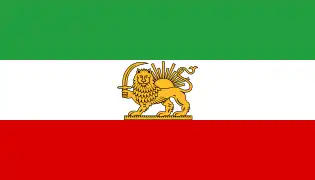 Iranian Imperial Family: Member 2nd Class of the Order of the Pleiades[73]
Iranian Imperial Family: Member 2nd Class of the Order of the Pleiades[73] Italy: Knight Grand Cross with Collar of the Order of Merit of the Italian Republic[73]
Italy: Knight Grand Cross with Collar of the Order of Merit of the Italian Republic[73] Japan:
Japan:
- Collar of the Order of the Chrysanthemum[73]
- Grand Cordon (Paulownia) of the Order of the Precious Crown[73]
 Jordan: Collar of the Order of Al-Hussein bin Ali[73]
Jordan: Collar of the Order of Al-Hussein bin Ali[73] Latvia: Commander Grand Cross with Chain of the Order of the Three Stars[73]
Latvia: Commander Grand Cross with Chain of the Order of the Three Stars[73] Lithuania: Grand Cross of the Order of Vytautas the Great[73][76]
Lithuania: Grand Cross of the Order of Vytautas the Great[73][76] Luxembourg: Knight of the Order of the Gold Lion of the House of Nassau[73]
Luxembourg: Knight of the Order of the Gold Lion of the House of Nassau[73] Mexico: Collar of the Order of the Aztec Eagle[73][77]
Mexico: Collar of the Order of the Aztec Eagle[73][77] Morocco: Grand Cordon of the Order of Ouissam Alaouite[73]
Morocco: Grand Cordon of the Order of Ouissam Alaouite[73] Netherlands: Knight Grand Cross of the Order of the Netherlands Lion[73]
Netherlands: Knight Grand Cross of the Order of the Netherlands Lion[73] Kingdom of Nepal: Member of the Nepal Decoration of Honour[73]
Kingdom of Nepal: Member of the Nepal Decoration of Honour[73] Norway:
Norway:
- Grand Cross with Collar of the Order of St. Olav[73]
- Recipient of the Silver Jubilee Medal of King Olav V[73]
- Recipient of the Silver Jubilee Medal of King Harald V[78]
 Poland:
Poland:
- Knight of the Order of the White Eagle[73]
- Grand Cross of the Order of Merit of the Republic of Poland[73]
 Portugal:
Portugal:
- Grand Collar of the Military Order of Saint James of the Sword[73]
- Grand Collar of the Order of Prince Henry[73]
 Romania: Collar of the Order of the Star of Romania[73]
Romania: Collar of the Order of the Star of Romania[73]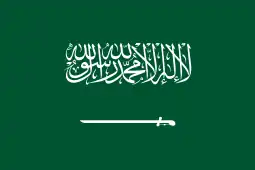 Saudi Arabia: Collar of the Order of Abdulaziz Al Saud[73]
Saudi Arabia: Collar of the Order of Abdulaziz Al Saud[73] Slovakia: Grand Cross of the Order of the White Double Cross[73]
Slovakia: Grand Cross of the Order of the White Double Cross[73] Slovenia: Member 1st Class of the Order of Freedom of the Republic of Slovenia[73]
Slovenia: Member 1st Class of the Order of Freedom of the Republic of Slovenia[73] Spain:
Spain:
- Lady of the Order of the Golden Fleece[73][79]
- Dame of the Collar of the Order of Charles III[73][80]
 Sweden:
Sweden:
- Member of the Royal Order of the Seraphim[73]
- Recipient of the 85th Birthday Medal of King Gustaf VI Adolf[73]
- Recipient of the 40th Birthday Medal of King Carl XVI Gustaf[73]
- Recipient of King Carl XVI Gustaf's 70th Birthday Commemorative Sign[73]
 South Africa: Grand Collar of the Order of Good Hope[73]
South Africa: Grand Collar of the Order of Good Hope[73] South Korea: Recipient of the Grand Order of Mugunghwa[73]
South Korea: Recipient of the Grand Order of Mugunghwa[73] Thailand:
Thailand:
- Dame of the Order of the Rajamitrabhorn[73]
- Dame of the Order of the Royal House of Chakri[73]
 United Arab Emirates: Grand Cordon of the Order of Al Kamal[73]
United Arab Emirates: Grand Cordon of the Order of Al Kamal[73] United Kingdom:
United Kingdom:
- Stranger Lady Companion of the Order of the Garter (7th Lady since 1901; 1979)[73]
- Recipient of the Royal Victorian Chain (1974)[73]
.svg.png.webp) Yugoslavia: Great Star of the Order of the Yugoslav Star[73]
Yugoslavia: Great Star of the Order of the Yugoslav Star[73]
Honorific eponyms
Awards
 Denmark: Queen Margrethe II's Science Award (2015)
Denmark: Queen Margrethe II's Science Award (2015)
Geographic locations
 Denmark: The Queen's Boulevard (1979)
Denmark: The Queen's Boulevard (1979) Greenland: Queen Margrethe II Land in Northeast Greenland was named in her honour on 16 April 1990 on the occasion of her 50th birthday[81]
Greenland: Queen Margrethe II Land in Northeast Greenland was named in her honour on 16 April 1990 on the occasion of her 50th birthday[81]
Objects
 Denmark: The Margrethe Bowl designed by her uncle, Sigvard Bernadotte, for Rosti in 1947
Denmark: The Margrethe Bowl designed by her uncle, Sigvard Bernadotte, for Rosti in 1947
Structures
 Denmark: Margrethe's Church in Valby (1968)
Denmark: Margrethe's Church in Valby (1968)
Nongovernmental organizations
 Slovakia: Tree of Peace Memorial Plaque. Awarded on 16 April 2020, on the occasion of her 80th birthday. Plaque presented on behalf of Servare et Manere on 29 September 2020 to Henning Fode, Private Secretary of the Queen by Miroslav Wlachovský, the Ambassador of the Slovak Republic to the Kingdom of Denmark.[82]
Slovakia: Tree of Peace Memorial Plaque. Awarded on 16 April 2020, on the occasion of her 80th birthday. Plaque presented on behalf of Servare et Manere on 29 September 2020 to Henning Fode, Private Secretary of the Queen by Miroslav Wlachovský, the Ambassador of the Slovak Republic to the Kingdom of Denmark.[82]
Honorary military appointments
 1972–1992: Colonel-in-Chief of the Queen's Regiment[83]
1972–1992: Colonel-in-Chief of the Queen's Regiment[83] 1992–1997: Allied Colonel-in-Chief (with Diana, Princess of Wales) of the Princess of Wales's Royal Regiment[83]
1992–1997: Allied Colonel-in-Chief (with Diana, Princess of Wales) of the Princess of Wales's Royal Regiment[83] 1997–2024: Colonel-in-Chief of the Princess of Wales's Royal Regiment[83]
1997–2024: Colonel-in-Chief of the Princess of Wales's Royal Regiment[83]
See also
References
- ↑ "150 years of the House of Glücksborg". 15 November 2013. Archived from the original on 8 December 2015. Retrieved 25 October 2014.
- 1 2 "Stats- og officielle besøg" [State and official visits]. Kongehuset (in Danish). 4 August 2020. Archived from the original on 25 June 2021. Retrieved 23 June 2021.
- ↑ "Statsbesøg til Forbundsrepublikken Tyskland" [State visit to the Federal Republic of Germany]. Kongehuset (in Danish). 22 September 2021. Archived from the original on 11 November 2021. Retrieved 11 November 2021.
- 1 2 Montgomery-Massingberd, Hugh, ed. (1977). Burke's Royal Families of the World. MCMLXXVII. Vol. I. London: Burke's Peerage Limited. pp. 62–63. ISBN 0-85011-023-8. OCLC 18496936.
- ↑ Stjer, Christian (2 June 2012). "Danskerne er vilde med kongehuset | Voxmeter" (in Danish). Archived from the original on 5 October 2022. Retrieved 23 June 2021.
- ↑ "Dronning Margrethe abdicerer: Træder tilbage 14. januar". DR. 31 December 2023. Archived from the original on 31 December 2023. Retrieved 31 December 2023.
- 1 2 3 4 5 6 7 8 "80 fakta om H.M. Dronningen". Kongehuset.dk (in Danish). 15 April 2020. Archived from the original on 2 January 2024. Retrieved 2 January 2024.
- 1 2 3 4 5 6 7 8 9 10 11 12 13 "Her Majesty Queen Margrethe II". Kongehuset.dk. Archived from the original on 7 February 2012. Retrieved 11 December 2014.
- ↑ "Navnet til den ny prinsesse..." nfi.ku.dk. Nordisk Forskningsinstitut, University of Copenhagen. 18 May 2012. Archived from the original on 2 February 2017. Retrieved 23 January 2017.
- ↑ Morris, Chris (13 January 2012). "Denmark's Queen Margrethe marks 40 years". BBC News. Archived from the original on 19 September 2020. Retrieved 11 May 2020.
- ↑ Christian X
- ↑ "Princess Margrethe, who is fifteen and is heir presumptive to the Danish throne, is to study for a year in England at North Foreland Lodge, a girls' boarding school near Basingstoke, in Hampshire...". The Illustrated London News. Vol. 227, no. 2. 1955. p. 552.
- 1 2 3 "Margrethe and Henrik Biography". Royalinsight.net. 16 April 1940. Archived from the original on 30 October 2011. Retrieved 3 February 2012.
- ↑ "PRINCE KNUD DIES; DANISH CLAIMANT". The New York Times. 15 June 1976.
- ↑ "The Royal House - The Danish Monarchy". www.kongehuset.dk. Danish Royal Court. Archived from the original on 8 February 2014. Retrieved 22 December 2013.
- ↑ "Elvis Presley with Princesses Margrethe of Denmark, Astrid of Norway, and Margaretha of Sweden". Elvispresleymusic.com.au. 7 June 1960. Archived from the original on 9 September 2015. Retrieved 11 December 2014.
- ↑ "Monpezat til Frederik og Joachim" [Monpezat for Frederik and Joachim]. Berlingske Tidende. 30 April 2008. Archived from the original on 4 May 2008. Retrieved 11 December 2014.
- ↑ "Denmark's Queen Margrethe strips four grandchildren of royal titles". the Guardian. 28 September 2022. Retrieved 29 September 2022.
- ↑ 'Shocked and confused': Denmark's queen strips royal titles from grandchildren Archived 30 September 2022 at the Wayback Machine, Euronews, September 29, 2022.
- ↑ Denmark’s Queen says sorry for family upset caused by taking away titles Archived 19 October 2022 at the Wayback Machine, The Guardian, 4 October 2022.
- ↑ "Queen Margrethe II of Denmark 40 years on the Throne". Radical Royalist. 13 January 2012. Archived from the original on 7 August 2017. Retrieved 11 December 2014.
- ↑ "The Monarchy today". Kongehuset.dk. Archived from the original on 15 February 2015. Retrieved 11 December 2014.
- ↑ "Nytårstafler og -kure" (in Danish). Kongehuset.dk. Archived from the original on 2 January 2024. Retrieved 2 January 2024.
- ↑ "Protektioner og æreshverv" (in Danish). Kongehuset.dk. Archived from the original on 2 January 2024. Retrieved 2 January 2024.
- ↑ "Denmark's Queen to publish history of the nation". The Local. Archived from the original on 2 January 2024. Retrieved 2 January 2024.
- ↑ "Connection with The Princess of Wales Royal Regiment". Kongehuset.dk. Archived from the original on 1 July 2023. Retrieved 2 January 2024.
- ↑ "Marselisborg Slot" [Marselisborg Castle]. Kongehuset.dk (in Danish). 20 December 2011. Archived from the original on 16 April 2021. Retrieved 16 April 2021.
- ↑ "Graasten Slot" [Graasten Castle]. Kongehuset.dk (in Danish). 20 December 2011. Archived from the original on 16 April 2021. Retrieved 16 April 2021.
- ↑ Graasten Palace and Palace Gardens
- 1 2 Ilse, Jess (20 November 2020). "The other Queen celebrating a jubilee in 2022". Royal Central. Archived from the original on 14 April 2021. Retrieved 14 April 2021.
- ↑ "Queen Margrethe II of Denmark marks 40 years on the throne". BBC News. 12 January 2012. Archived from the original on 14 March 2017. Retrieved 22 June 2018.
- ↑ "dumsmart — Den Danske Ordbog". ordnet.dk (in Danish). Archived from the original on 2 January 2024. Retrieved 2 January 2024.
- ↑ "Historiker om Margrethes danskheds-udtalelse: - Hun har fulgt folkesjælens bekymringer". TV2 (Denmark). 23 October 2016. Archived from the original on 10 June 2023. Retrieved 25 October 2016.
- ↑ "Dronning Margrethe om integration: "Det er ikke en naturlov, at man bliver dansker af at bo i Danmark"". Berlingske Tidende. 22 October 2016. Archived from the original on 3 August 2018. Retrieved 25 October 2016.
- ↑ "Modified celebration of the 50th Jubilee of HM The Queen's Accession to the Throne". The Royal House. 9 September 2022. Archived from the original on 5 February 2023. Retrieved 1 February 2023.
- ↑ "Margrethe II: Who is the chain-smoking, fashion-forward Queen of Denmark?". Independent. 1 January 2024. Archived from the original on 1 January 2024. Retrieved 2 January 2024.
- ↑ "Queen of Denmark announces abdication live on TV". BBC News. BBC. 31 December 2023. Archived from the original on 31 December 2023. Retrieved 31 December 2023.
- 1 2 "Read HM The Queen's New Year Address 2023". kongehuset.dk. 31 December 2023. Archived from the original on 1 January 2024. Retrieved 1 January 2024.
- ↑ Einarsdóttir, Silja Björklund (31 December 2023). "Dronning Margrethe av Danmark går av". NRK. Archived from the original on 31 December 2023. Retrieved 31 December 2023.
- ↑ "Missede du det store øjeblik? Se hele dronning Margrethes tale her". DR (in Danish). 31 December 2023. Archived from the original on 1 January 2024. Retrieved 31 December 2023.
- ↑ "Changes in the titles of The Royal Family". kongehuset.dk. 2 January 2024. Archived from the original on 3 January 2024. Retrieved 3 January 2024.
- ↑ "Slidgigt, allergi og kræft". BT. 27 December 2001. Archived from the original on 26 September 2022. Retrieved 27 September 2022.
- 1 2 "Dronning Margrethe er begyndt genoptræning". Berlingske. 23 February 2023. Archived from the original on 23 February 2023. Retrieved 24 February 2023.
- ↑ "HM The Queen has tested positive for COVID-19". www.kongehuset.dk. Archived from the original on 21 April 2022. Retrieved 9 February 2022.
- ↑ "H.M. Dronningen kan ophæve sin isolation" [HM The Queen can lift her isolation]. www.kongehuset.dk. Archived from the original on 13 February 2022. Retrieved 13 February 2022.
- ↑ "Queen of Denmark tests positive to COVID-19 after attending funeral of Queen Elizabeth II". ABC News. 21 September 2022. Archived from the original on 21 September 2022. Retrieved 21 September 2022.
- ↑ "Danish queen tests positive after UK monarch's funeral". ABC News. Archived from the original on 21 September 2022. Retrieved 21 September 2022.
- ↑ "Dronning Margrethe er ude af coronaisolation - har det "fint, fint"". TV2. 26 September 2022. Archived from the original on 26 September 2022. Retrieved 27 September 2022.
- 1 2 "Danish queen to undergo 'major back surgery'". AP News. 8 February 2023. Archived from the original on 8 February 2023. Retrieved 8 February 2023.
- ↑ "Danish queen discharged from hospital after back surgery". AP News. 2 March 2023. Archived from the original on 11 May 2023. Retrieved 10 May 2023.
- ↑ Isherwood, Julian (23 March 2001). "Danish royals angry at cancer accusation". bbc.co.uk. BBC News. Archived from the original on 7 August 2017. Retrieved 11 December 2014.
- ↑ "Margrethe skruer ned for røgen". bt.dk. 26 November 2006. Archived from the original on 16 October 2007. Retrieved 7 May 2014.
{{cite web}}: CS1 maint: bot: original URL status unknown (link) - ↑ "Hemmeligheden bag dronning Margrethes blomstrede regnfrakke". Billed Bladet. 19 July 2017. Archived from the original on 2 January 2024. Retrieved 2 January 2024.
- ↑ "As Queen Margrethe Of Denmark Announces Her Surprise Abdication, A Look Back At Her Eccentric Royal Style". British Vogue. 2 January 2024. Archived from the original on 19 April 2021. Retrieved 26 April 2021.
- ↑ Cartner-Morley, Jess; Mirren, Helen; Huffington, Arianna; Amos, Valerie (28 March 2013). "The 50 best-dressed over 50s". The Guardian. Manchester, UK. Archived from the original on 20 April 2016. Retrieved 12 December 2016.
- ↑ Madsen, Anders Christian (2 May 2020). "Meet Queen Margrethe Of Denmark, An Unsung Style Heroine". British Vogue. Condé Nast. Archived from the original on 19 April 2021. Retrieved 26 April 2021.
- ↑ Scocozza, Benito (1997). Politikens bog om danske monarker (1. udg ed.). København: Politiken. pp. 204–205. ISBN 87-567-5772-7. OCLC 57288915.
- ↑ "Church textiles". Kongehuset.dk. Archived from the original on 2 January 2024. Retrieved 2 January 2024.
- ↑ "HM The Queen has created a new chasuble for the Danish Church in London". Kongehuset.dk. 6 December 2020. Archived from the original on 2 January 2024. Retrieved 2 January 2024.
- ↑ "Decorations and design". kongehuset.dk. Archived from the original on 2 January 2024. Retrieved 2 January 2024.
- 1 2 "Découpage". kongehuset.dk. 2 January 2024. Archived from the original on 2 January 2024. Retrieved 2 January 2024.
- 1 2 "Embroideries". kongehuset.dk. Archived from the original on 2 January 2024. Retrieved 2 January 2024.
- ↑ "Vild nyhed lige inden tronskifte: Dronning Margrethe nomineret til stor pris". Billed Bladet (in Danish). 9 January 2024. Archived from the original on 9 January 2024. Retrieved 9 January 2024.
- ↑ "Dronning Margrethe tegnet Ingrid Alexandras monogram". VG. 13 April 2004. Archived from the original on 25 December 2023. Retrieved 25 December 2023.
- ↑ "Scenography and costume design". kongehuset.dk. Archived from the original on 2 January 2024. Retrieved 2 January 2024.
- ↑ "De vilde svaner (2009)". Internet Movie Database. Archived from the original on 15 September 2014. Retrieved 11 December 2014.
- ↑ The Guardian, "Queen of Denmark hired as set designer on new Netflix film", 31 August 2021 Archived 27 October 2023 at the Wayback Machine. Retrieved 27 October 2023.
- ↑ The New York Times, "Scream Queen? More Like Steam Queen", 10 October 2023 Archived 27 October 2023 at the Wayback Machine. Retrieved 27 October 2023.
- ↑ "Scenografi og kostumer". Tivoli. Archived from the original on 14 December 2023. Retrieved 15 December 2023.
- ↑ "Visual art". kongehuset.dk. Archived from the original on 2 January 2024. Retrieved 2 January 2024.
- ↑ Roxborough, Scott (31 August 2021). "The Danish Queen Will Be the Set Designer on a New Netflix Film". The Hollywood Reporter. Archived from the original on 31 August 2021. Retrieved 31 August 2021.
- ↑ "One Queen to Rule Them All: Margrethe II of Denmark". National Museum of Women in the Arts. 25 February 2013. Archived from the original on 1 January 2024. Retrieved 1 January 2024.
- 1 2 3 4 5 6 7 8 9 10 11 12 13 14 15 16 17 18 19 20 21 22 23 24 25 26 27 28 29 30 31 32 33 34 35 36 37 38 39 40 41 42 43 44 45 46 47 48 49 50 51 52 53 54 55 56 57 58 59 60 61 "Dekorationer". Kongehuset.dk. Archived from the original on 16 June 2020. Retrieved 24 June 2020.
- ↑ "Bundeskanzler Anfragebeantwortung An die Präsidentin des Nationalrats" [Reply to a parliamentary question about the Decoration of Honour] (PDF). Parlament.gv.at (in German). p. 168. Archived (PDF) from the original on 7 August 2022. Retrieved 1 November 2012.
- ↑ "Fálkaorðuhafar" [Holders of the Commander's Cross]. The President of Iceland. Archived from the original on 20 December 2014. Retrieved 11 December 2014.
- ↑ "Apdovanojimai" [Awards Database]. President of the Republic of Lithuania. Archived from the original on 19 April 2014. Retrieved 11 December 2014.
- ↑ "ACUERDO por el que se otorga a Su Majestad Margrethe II Reina de Dinamarca, la Condecoración de la Orden Mexicana del Aguila Azteca en el grado de Collar" [AGREEMENT that the Collar of the Order of the Aztec Eagle is awarded to Her Majesty Queen Margrethe II of Denmark]. Secretariat of the Interior. 13 February 2008. Archived from the original on 29 April 2021. Retrieved 11 December 2014.
- ↑ "Tildeling av Kong Harald Vs jubileumsmedalje 1991-2016". Kongehuset (in Norwegian). Archived from the original on 25 January 2016. Retrieved 20 January 2016.
- ↑ "REAL DECRETO 1948/1985. de 23 de octubre. por el Que se concede el Collar de la Insigne Orden del Toisón de Oro a Su Majestad Margarita ll, Reina de Dinamarca" [Her Majesty Margrethe II, Queen of Denmark is awarded the Collar of the Illustrious Order of the Golden Fleece] (PDF). Boletín Oficial del Estado. 24 October 1985. Archived (PDF) from the original on 24 September 2015. Retrieved 11 December 2014.
- ↑ "REAL DECRETO 738/1980, de 15 de marzo, por el que se concede el Collar de la Real y Muy Distinguida Orden de Carlos Ill a Su Majestad Margarita ll, Reina de Dinamarca" [Royal Decree 738/1980 of 15 March, granting the Collar of the Royal and Most Distinguished Order of Carlos III Margarita ll to Her Majesty, Queen of Denmark] (PDF). Boletín Oficial del Estado. 24 April 1980. Archived (PDF) from the original on 4 March 2016. Retrieved 11 December 2014.
- ↑ Higgins, Anthony K. (2010). "Catalogue of place names in northern East Greenland" (PDF). Exploration history and place names of northern East Greenland. Geological Survey of Denmark and Greenland. p. 158. Archived (PDF) from the original on 18 May 2018. Retrieved 22 August 2019.
- ↑ Servare et Manere (5 October 2020). "Her Majesty Queen Margrethe II of Denmark received the highest Servare et Manere award". Tree of peace / Strom pokoja. Archived from the original on 27 January 2021. Retrieved 26 December 2020.
- 1 2 3 "Connection with The Princess of Wales Royal Regiment". The Danish Royal House. 22 April 2023. Archived from the original on 1 July 2023. Retrieved 30 June 2023.
Bibliography
- Andersen, Jens (2011). Nørholm, Elise H. (ed.). M, 40 år på tronen (in Danish) (1st ed.). Copenhagen: Lindhardt og Ringhof. ISBN 9788711419694.
- Bloch Skipper, Jon (2008). Tre søstre : samtaler mellem dronning Margrethe, prinsesse Benedikte og dronning Anne-Marie [Three sisters: conversations between Queen Margrethe, Princess Benedikte and Queen Anne-Marie] (in Danish). Copenhagen: Lindhardt og Ringhof. ISBN 978-87-11-30060-2.
- Bramsen, Bo (1992). Huset Glücksborg. Europas svigerfader og hans efterslægt [The House of Glücksburg. The Father-in-law of Europe and his descendants] (in Danish) (2nd ed.). Copenhagen: Forlaget Forum. ISBN 87-553-1843-6.
- Dehn-Nielsen, Henning (2005). Margrethe 2., Danmarks dronning (in Danish) (3rd ed.). Copenhagen: Aschehoug. ISBN 8711222832.
- Fabricius Møller, Jes (2013). Dynastiet Glücksborg, en Danmarkshistorie [The Glücksborg Dynasty, a history of Denmark] (in Danish). Copenhagen: Gad. ISBN 9788712048411.
- Lerche, Anna; Mandal, Marcus (2003). A royal family : the story of Christian IX and his European descendants. Copenhagen: Aschehoug. ISBN 9788715109577.
- Lyding, Henrik (2009). Dronningens teater (in Danish). Copenhagen: Gyldendal. ISBN 9788702078787.
- Margrethe II (2012). Andersen, Jens (ed.). Om man så må sige, 350 Dronning Margrethe-citater (in Danish). Copenhagen: Lindhardt og Ringhof. ISBN 9788711394168.
- Rubinstein, Mogens (1996). Dronning Margrethe II, 25 år som regent (in Danish). Copenhagen: Møntergården. ISBN 8775535521.
- Scocozza, Benito (1997). "Margrethe 2.". Politikens bog om danske monarker [Politiken's book about Danish monarchs] (in Danish). Copenhagen: Politikens Forlag. pp. 204–209. ISBN 87-567-5772-7.
- Skipper, Jon Bloch (2008). Tre søstre, samtaler mellem dronning Margrethe, prinsesse Benedikte og dronning Anne-Marie (in Danish). Copenhagen: Lindhardt og Ringhof. ISBN 9788711300602.
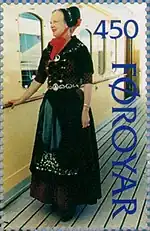
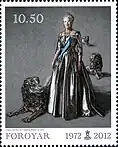


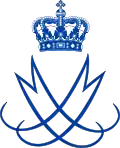
.svg.png.webp)
